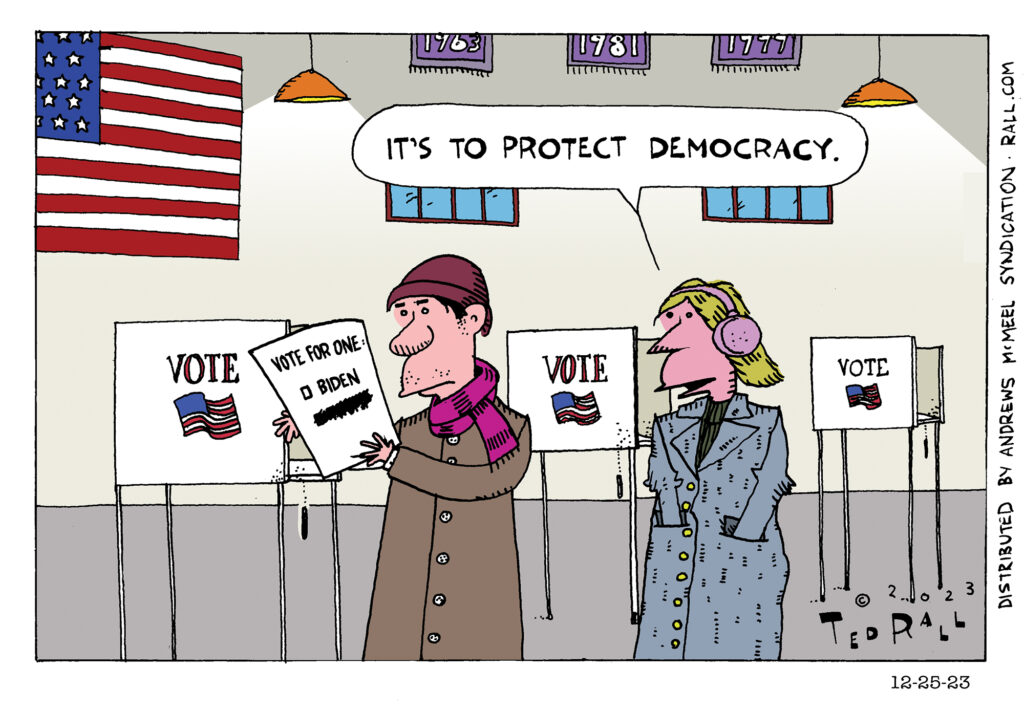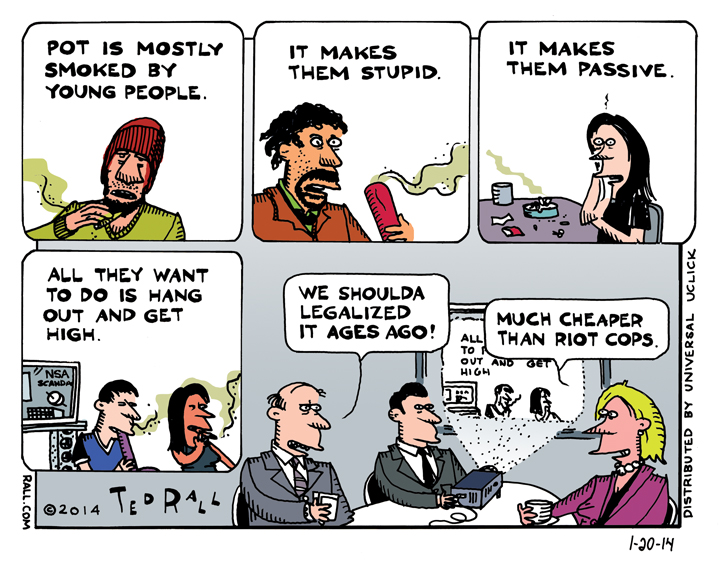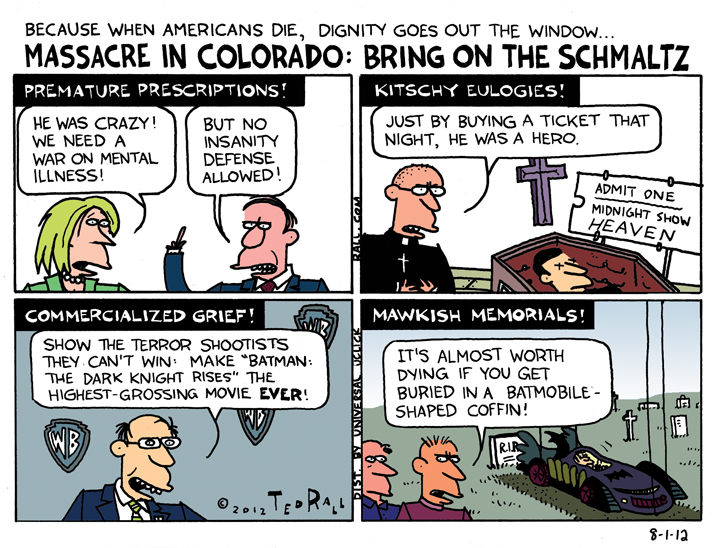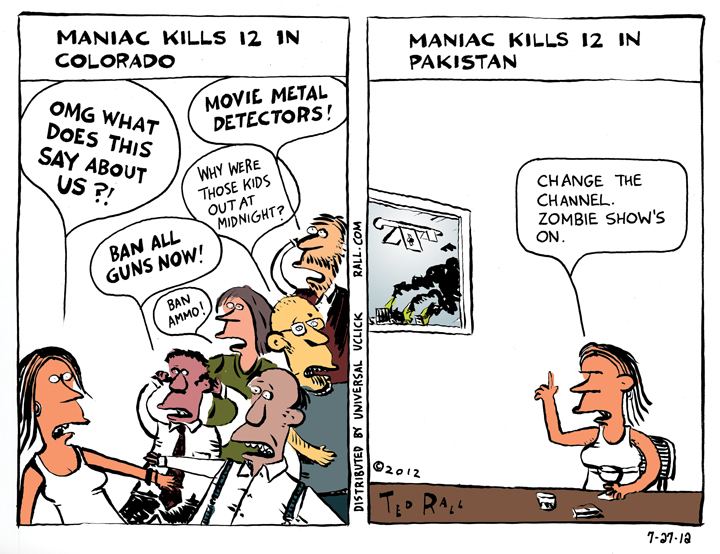The Colorado Supreme Court ordered Donald Trump’s name removed from the ballot in that state on the ground that he is an insurrectionist, who tried to subvert electoral democracy, under the meaning of the 14th Amendment. 13 other states may follow suit.
The Final Countdown – 12/21/23 – Jack Smith Bolsters Legal Team with Renowned Supreme Court Expert for Trump Investigation
 On this episode of The Final Countdown, host Ted Rall covered topics from around the world, including lawyer Jack Smith adding a Supreme Court specialist to his legal team.
On this episode of The Final Countdown, host Ted Rall covered topics from around the world, including lawyer Jack Smith adding a Supreme Court specialist to his legal team. DMZ America Podcast #129: Trump Dumped from Colorado Ballot, Biden’s Record-Low Polls, Will Anyone Care When Gaza is Gone? (with guest Rob Rogers)
In the latest DMZ America Podcast, editorial cartoonists Ted Rall (from the Left) and Scott Stantis (from the Right) are joined by their colleague Rob Rogers, editorial cartoonist formerly of the Pittsburgh Post-Gazette.
First up: The political world reeled after the Colorado state Supreme Court issued a stunning ruling declaring Donald Trump an insurrectionist under the 14th Amendment to the Constitution, thus making him ineligible to appear on the ballot in the upcoming state Republican primary. 13 other states are facing similar lawsuits so the U.S. Supreme Court is expected to weigh in on whether Trump can appear on the ballot. Will judges decide our next president?
Second: President Biden is suffering from the lowest poll numbers of his presidency, bottoming out at 34% in one survey. He is even losing voters aged 18 to 29, an important part of his coalition back in 2020. Now he’s between a rock and a hard place on issues like Gaza. Is there any way that he can possibly turn this dismal situation around, given the fact that no one who his position has gone on to successfully be re-elected?
Finally: Most of the world now agrees that Israel overreacted to the October 7 terrorist attack by Hamas. Gaza has been flattened. Will the attention of the world move on after the bombing stops? Or will images of shattered millions of Palestinian refugees living in the Egyptian desert prove to be a political game changer during the election next year?
Watch the Video Version of the DMZ America Podcast:
DMZ America Podcast Ep 129 Sec 1: Trump Dumped from Colorado Ballot
DMZ America Podcast Ep 129 Sec 2: Biden’s Record-Low Polls
DMZ America Podcast Ep 129 Sec 3: Will Anyone Care When Gaza is Gone?
SYNDICATED COLUMN: Gun Control Talk Is Cheap. A Sane Mental Health System Is Not.
Guess Which Policy Prescription We Hear After Shooting Sprees?
It is, unfortunately, necessary to state the obvious after America’s latest mass shooting in Colorado. Like: we don’t know why James Holmes, the 24-year-old suspect, shot up that movie theater. We don’t know his mental state. Given the legal presumption of innocence, we shouldn’t write with certainty that it was him.
Given how the 24-hour news cycle has expanded the American media’s love of speculation, however, the Batman Bloodbath became fodder for political policy prescriptions the moment the first round left the chamber of Holmes’ (or whomever’s) AR-15.
We saw it after Columbine, when conservatives blamed goth, video games and the so-called “trenchcoat mafia.” Liberals (me included) set their sights on bullying jocks. Both sides were wrong—Eric Harris and Dylan Klebold were probably mentally ill, simply victims of one or more not-so-simple personality disorders—yet the political debate ultimately prompted schools to adopt increased security measures and zero tolerance policies against bullying. State legislatures passed minor gun control laws.
Which may have been good ideas. But they didn’t stop it from happening again.
The gun control debate took center stage after student Seung-Hui Cho shot 32 people to death at Virginia Tech in 2007. Liberals said people with a history of mental health issues shouldn’t be able to buy guns. Arguing that Cho’s victims would have been able to defend themselves had they been packing, right-wingers pushed to allow students to carry weapons on campuses.
Some commentators wondered aloud whether the United States should make it easier for people with mental health issues to seek and obtain help. But that line of discussion was quickly drowned out by the gun control debate.
Now the pattern is repeating itself. We know what happened, but we don’t know why.
We know that high-powered automatic weaponry was involved. Most of us assume that Holmes, though purportedly intelligent and educated, was deranged; why else would anyone slaughter innocent strangers in a movie theater?
Given these assumptions, which may turn out be wrong—the Fort Hood shooter, thought by some to be suffering from PTSD, was most likely “self radicalized” by U.S. foreign policy, making the killings a political act—it follows that we would try to prevent future similar tragedies by promoting policies in line with our personal ideological preconceptions, and that the political class and their media allies would promote themselves by marketing such “solutions” to us voters and consumers.
Setting aside the caveat that we still don’t know why it happened, the big guns/crazy young white guy dynamic leads to two obvious policy prescriptions: gun control and improving access to mental health care. Post-Aurora, we’re seeing a lot of the former, including calls for numerical limits on ammo sales—but relatively few of the latter. David Brooks, a conservative columnist at The New York Times, is an interesting exception. “These killers are primarily the product of psychological derangements, not sociological ones,” Brooks writes. But even he won’t call for a national War on Mental Illness: “The best way to prevent killing sprees is with relationships—when one person notices that a relative or neighbor is going off the rails and gets that person treatment before the barbarism takes control. But there also has to be a more aggressive system of treatment options, especially for men in their 20s.”
Well, yes. But not everyone has a relative or a concerned neighbor. Without a real commitment to treating, and thus destigmatizing mental illness—in other words, providing free, simple and easy access to mental health professionals for everyone—they’re empty words.
A 2008 study found that six percent of Americans suffer from serious mental illnesses, which resulted in an estimated economic loss of $200 billion annually in lost earnings. (This doesn’t include the one-quarter of the population who have less serious, diagnosable conditions.)
Sixty percent of people with mental illness seek no treatment whatsoever. It’s easy to see why: Americans with limited funds must make do with a lame hodgepodge of options when they feel themselves going off the rails: suicide prevention hotlines, support groups, and absurdly low allocations of shrink visits under group insurance plans.
Along with vision and dental care, mental health is an ugly stepsister of America’s frayed healthcare infrastructure, regarded as a supplemental luxury, and funded accordingly. If it isn’t overturned by a Romney Administration, Obama’s Affordable Care Act will help make “mental health parity”—forcing insurers to treat mental illness at the same priority level as physical ailments—a practical reality. But, failing a public option—or, what we really need, fully socialized medicine—the overall plan doesn’t go nearly far enough.
Gun control talk is cheap. A national mental healthcare system that works would be expensive.
Would either one prevent the next shooting spree? Maybe. Maybe not. Like zero tolerance for bullying, they might be a good idea no matter what—but we won’t be any closer to a solution.
(Ted Rall’s new book is “The Book of Obama: How We Went From Hope and Change to the Age of Revolt.” His website is tedrall.com. This column originally appeared at NBCNews.com)
(C) 2012 TED RALL, ALL RIGHTS RESERVED.




